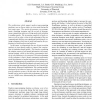Free Online Productivity Tools
i2Speak
i2Symbol
i2OCR
iTex2Img
iWeb2Print
iWeb2Shot
i2Type
iPdf2Split
iPdf2Merge
i2Bopomofo
i2Arabic
i2Style
i2Image
i2PDF
iLatex2Rtf
Sci2ools
114
click to vote
AINA
2009
IEEE
2009
IEEE
Predictive Simulation of HPC Applications
The architectures which support modern supercomputing machinery are as diverse today, as at any point during the last twenty years. The variety of processor core arrangements, threading strategies and the arrival of heterogeneous computation nodes are driving modern-day solutions to petaflop speeds. The increasing complexity of such systems, as well as codes written to take advantage of the new computational abilities, pose significant frustrations for existing techniques which aim to model and analyse the performance of such hardware and software. In this paper we demonstrate the use of post-execution analysis on trace-based profiles to support the construction of simulation-based models. This involves combining the runtime capture of call-graph information with computational timings, which in turn allows representative models of code behaviour to be extracted. The main advantage of this technique is that it largely automates performance model development, a burden associated with...
AINA 2009 | Computer Networks | Heterogeneous Computation Nodes | Modern Supercomputing Machinery | Real-world Supercomputing Benchmark |
Related Content
| Added | 18 May 2010 |
| Updated | 18 May 2010 |
| Type | Conference |
| Year | 2009 |
| Where | AINA |
| Authors | Simon D. Hammond, J. A. Smith, Gihan R. Mudalige, Stephen A. Jarvis |
Comments (0)

